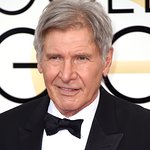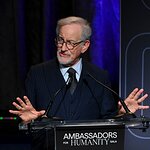By Tim Saunders on
Look To The Stars’ Features Editor Tim Saunders takes an in-depth look at the career and philanthropy of Harrison Ford.
Unlike Indiana Jones, Harrison Ford actually likes snakes. In fact he likes a lot of the creatures that most people fear. He even has a Californian spider, Calponia harrisonfordi, named after him, its eight hairy legs enough to give almost anyone nightmares, and a South American ant also bears his name. Snakes of all sorts make their home around the white-painted ranch house he built himself in Jackson Hole, Wyoming, and they slither and slide their way in and out of the shrubs and pockets of grass that dot the barren landscape.
The mountains that surround Ford’s house are among the most rugged in the state. Their jagged peaks create a feeling that the whole world exists within their confines, and the arid plains that run between them consistently record some of the most extreme temperatures in the United States. It is an area that conjures up images of America’s pioneers, of Lois and Clarke, of place names such as Owl Creek, Dead Indian Pass, and the Big Horn Mountains, romantic visions of a past long gone.
“My interests in the environment came from being in Jackson,” Ford once said to the Sunday Times. “I’d purchased land and I had a sense of stewardship about the place, because the majesty of nature is so apparent there. I have a sense of awe, a sense that nature is so complex and fascinating that it’s as close as I’ve come to understanding the notion of divinity.”
Almost half of Ford’s 800-acre ranch is now a nature reserve. It was a decision the actor found easy.
“It sort of fit this picture I had in my head that I’d carried around for a long time,” he said. “A picture of what the American paradise would look like. Woods and streams and stuff like that. Clear, mountain air…”
Ford has always had a high regard for the environment. As a child he wanted to be either a forest ranger or a farmer. Adventure was his calling, but little was to be found around his home. He grew up in a liberal, middle-class family in suburban Illinois. His father, Christopher, was a successful advertising executive and part-time actor who did commercial voice-overs. His mother, Dorothy, was a former radio actress.
In 1960, at the age of 18, Ford entered Ripon College, a well-known arts school in Wisconsin. But he lacked both the drive and enthusiasm to graduate, and preferred to spend time in theatre groups.
“I found a purpose in becoming an actor that I hadn’t found in any other ways,” he said. “In college, I found a group of people with whom I could work on a common idea. I learnt to act… I had always loved stories – emotionally I’m drawn to them – and acting is storytelling. So acting is what I chose to do.”
After registering as a conscientious objector during the Vietnam war, Ford moved his young family – which included a wife and two young sons – to California, where he started attracting bit parts in B-grade westerns and TV shows. But the work simply did not put food on the table for the Ford family, and the struggling actor turned his back on his fledging career to concentrate on another vocation – carpentry.
After buying a cheap house in the Hollywood Hills, Ford began remodelling and quickly became adept with the hammer and saw. The venture soon turned lucrative when a friend recommended Ford to Brazilian musician Sergio Mendes, who needed a new recording studio. The job led to others, and eventually Ford became a “carpenter for the stars.”
A chance encounter with George Lucas led Ford to return to acting with a role in American Graffiti. A few words from Steven Spielberg then prompted Lucas to hire Ford for the role of Han Solo, the wise cracking space smuggler in his next feature, Star Wars.
The rest, as they say, is history. In the wake of Star Wars’ success, Ford appeared in a number of films, but it was Spielberg’s decision to cast him in Indiana Jones and the Raiders of the Lost Ark – a role originally written for Tom Selleck – that shot Ford into orbit. Of the 20+ films he has had a leading role in since Star Wars, 9 of them have grossed over $100 million each. Frantic, Blade Runner, The Fugitive, and Air Force One have all led to his reputation as one of cinema’s greatest action heroes.
Ford has been married twice, and is currently in a relationship with actress Calista Flockhart. The former Ally McBeal star is an avid and enthusiastic supporter of causes such as breast cancer research and domestic violence, and Ford often accompanies her to events to raise money and awareness of social issues. In November 2007, the pair joined Kirk Douglas in Los Angeles to provide Thanksgiving meals for the homeless.
But Ford’s overwhelming passion is the environment. In 1991, he was introduced to Conservation International, one of the world’s leading environmental research groups, and was deeply impressed with the intellectual capacity of its directors. Founded in 1987, Conservation International provides a fund for scientists in 30 countries to identify and overcome biodiversity threats. It focuses its efforts on tropical wilderness areas, marine areas, and major wetlands, and since its inception has donated over $100 million to conservation partners around the world.
Ford joined the ranks of Conservation International as a board member, and soon became vice chairman. He became actively involved in the organization’s design and growth, and now sits on the Executive Committee.
“I was looking for a way to give back,” he explained to the Epoch Times. “What kept my support is their success and the inventiveness of their strategies.”
He calls the battle for conservation ‘a war without an evil enemy’ and believes that it can be won. ‘What we do today will set the course and the example for generations to come.’
Besides his work with Conservation International, Ford also serves as the first ‘airborne watchdog’ for the environmental group Riverkeeper, which identifies and prosecutes polluters of the Hudson River. He patrols the waterway in his helicopter and in 2002 received a Lindbergh Award for his efforts.
Flying is another passion for the actor. In 2004, Ford became the Honorary Chairman of Young Eagles, a program designed to give children a chance to fly in an aircraft for free. The initiative was launched in 1992, and has since flown over 1.3 million children, with volunteer pilots covering all of the costs. Ford has flown over 280 children in his own time, showing them the wide-open plains and rugged mountain areas of America. He says it is the best way to educate young people about nature, and about themselves.
“One of the wonderful things about aviation is that freedom and responsibility are great things for kids to be exposed to,” he told Airport Journals. “To be able to see the world in a three-dimensional way, and to give them a sense of the possibility that they might enjoy that freedom themselves, if they work for it.”
Since joining Conservation International over 16 years ago, Harrison Ford has donated large amounts of time, money, and land to conservation issues. He is also the honorary chairman for the Indianapolis Prize, one of the world’s leading awards for animal conservation. In return, he has received a whole swag of honours himself, including the Jules Verne Spirit of Nature Award, the KT Hurley Award for his work helping young people with their conservation projects, the World Ecology Award from the International Center for Tropical Ecology, the Global Environmental Citizen Award from the Harvard Medical School, and the Good Steward Award from the US House of Representatives. He claims these honours more than make up for the fact he has never won an Oscar.
But then, Harrison Ford isn’t really the sort of man who likes being in the limelight, and prefers to let his movies and actions speak for him.
If there is one thing the Indiana Jones star does want, it is for people to have a long hard look at themselves.
“We’re losing species at a rate that’s not been seen before; and it’s a result of human interference,” he said to Sunday Times Magazine. “I have four children and two grandsons. I feel responsible for tending to things I can affect as a private person, not as a celebrity. I can’t fix the world, but it’s our duty to help how we can. We have a moral responsibility for what we do as individuals. We have to accept it.”
Copyright © 2009 Look to the Stars






